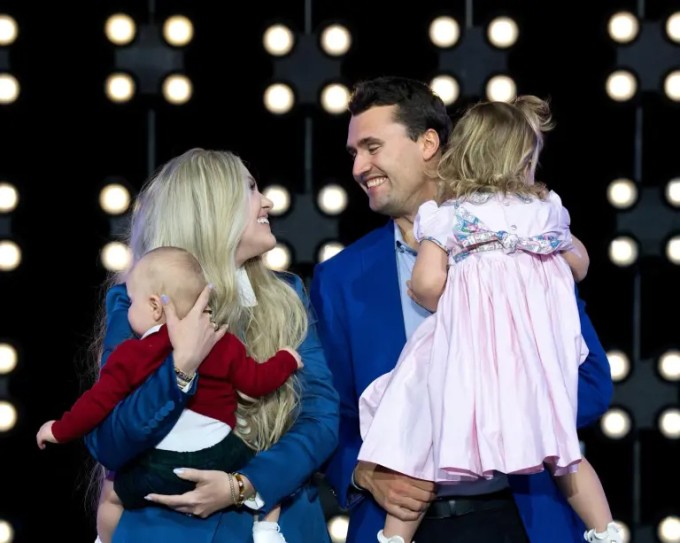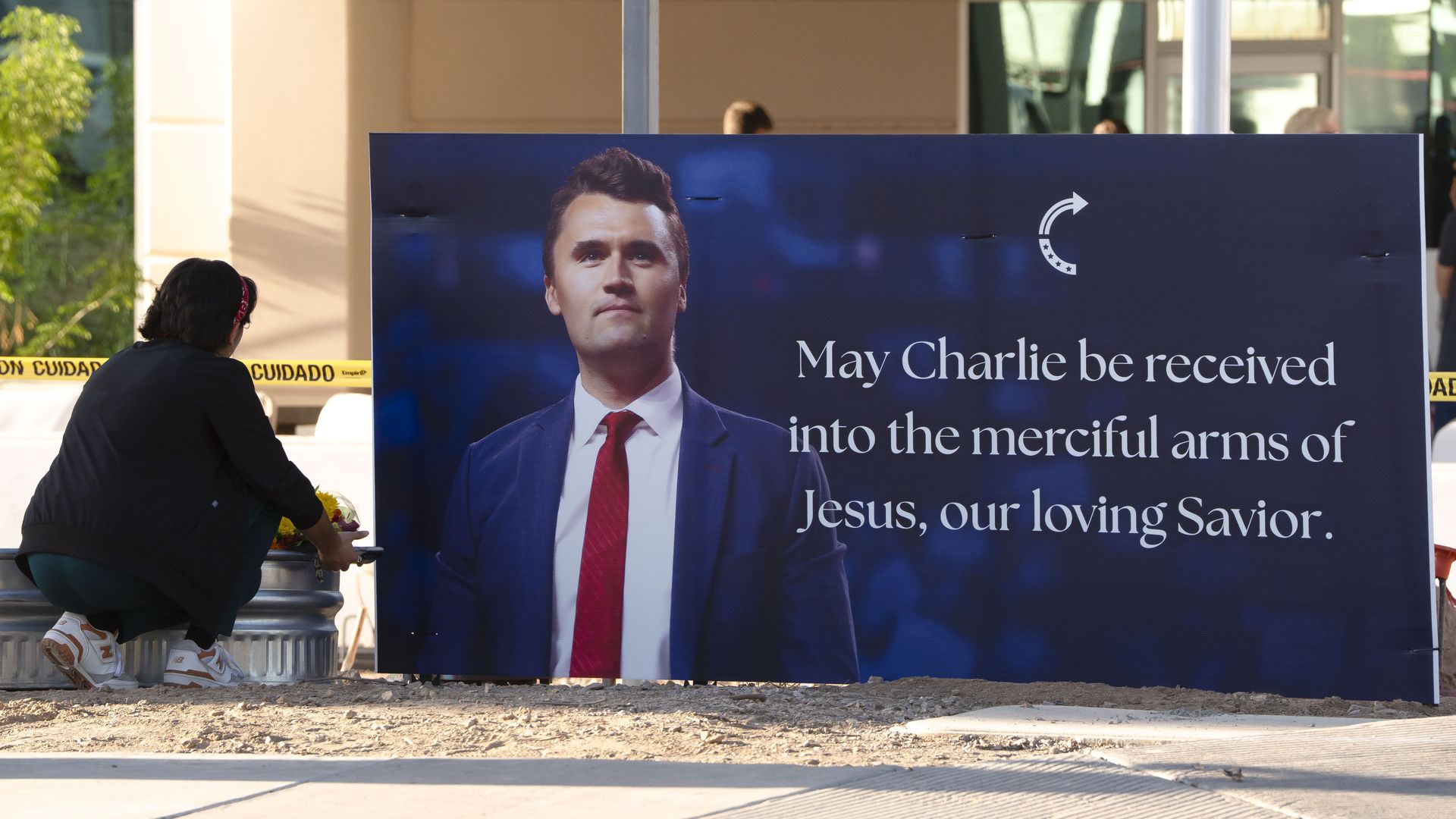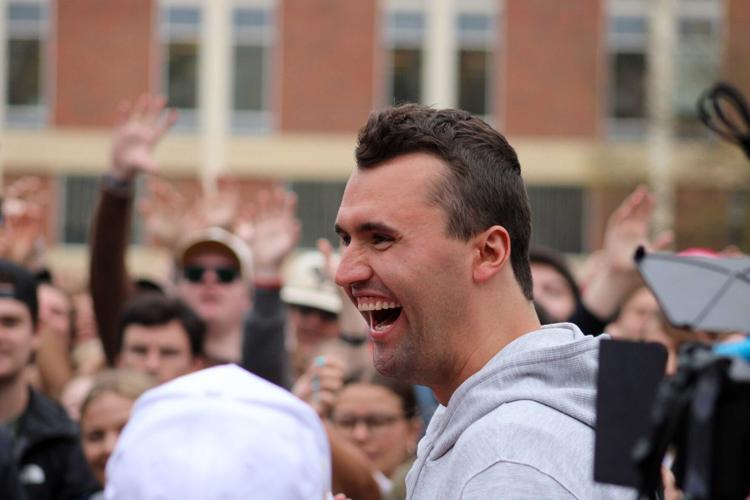When Charlie Kirk walked onto the stage at Utah Valley University, no one could have predicted that within minutes the room would be overcome not with the sound of applause but with stunned silence. At just 31 years old, Kirk had already carved out a national platform as one of the most prominent conservative activists of his generation. His sudden death — a collapse that left his wife Erika, their two young children, and countless supporters across the country reeling — has turned into a moment that is as politically charged as it is personally heartbreaking.
The tragedy has forced a nation to pause. What began as a university event meant to showcase dialogue and debate ended with an empty podium, a grief-stricken audience, and questions that no answer seems capable of resolving. Beyond the headlines, the loss of Kirk has exposed the fragility of public life, the power of media to magnify grief, and the deep cultural divides over how leaders are remembered in America today.
The shock of a nation
Witnesses at the Utah Valley event recall how Kirk, smiling and animated, stepped up to the microphone. He was in his element — speaking to young students, engaging in the energetic back-and-forth that defined his career. For a few moments, it was a routine stop in what had become his life’s work: connecting politics with youth culture. But in a flash, everything changed.

Reports describe the atmosphere as instantly surreal. Gasps rippled through the audience as Kirk suddenly faltered. Some believed it was a pause for dramatic effect. Others assumed he was about to launch into one of his rhetorical flourishes. But when he collapsed, confusion turned into horror. Emergency crews rushed in, but within minutes, the news spread: Charlie Kirk was gone.
The speed of the event, paired with the scale of his influence, made the loss feel unreal. Social media was instantly flooded with disbelief. “This can’t be real,” one supporter wrote, echoing the sentiment of millions who had grown accustomed to seeing Kirk daily on television, podcasts, or his social feeds.
Erika’s silent struggle
While the public reckoned with shock, the most devastating impact fell on Erika Kirk, his wife of four years. Just days before the tragedy, the couple had been planning their future — from small family moments like birthday parties for their children to larger ambitions involving their work and shared advocacy.
In a heartbreaking image that has since circulated widely, Erika was seen sitting in stunned silence, her children playing beside her, seemingly unaware of the enormity of their father’s absence. Friends close to the family have described her as “resilient but broken,” a mother forced to comfort her children while carrying grief that feels unbearable.
Erika’s challenge is not only personal but symbolic. She has become, unwillingly, the figure through which a nation sees the raw costs of public tragedy. Every message of condolence, every tribute on television, is a reminder of a future abruptly stolen. Yet in her quiet moments, as letters of support pile on her doorstep, Erika has confessed to those near her that these words, however painful, are what help her keep moving forward.
A career cut short
Charlie Kirk’s life was one marked by acceleration. From his teenage years, he was propelled into the spotlight as a dynamic conservative voice. By 20, he had co-founded Turning Point USA, a group that grew into a powerhouse for youth political engagement. By his early 30s, he was not just an activist but a national personality, with access to the highest levels of power and influence.
Supporters admired his unapologetic defense of conservative values, while critics accused him of stoking division. Regardless of where one stood, it was impossible to ignore him. His ability to command attention — on campus stages, in television studios, across digital platforms — positioned him as a rising force in American politics.
That his career ended abruptly at 31 only amplifies the sense of unfinished business. What would have been his next chapter? A run for office? A shift toward broader cultural leadership? These are now only speculative questions, left unanswered by a silence that continues to echo.
The children left behind
Perhaps the most painful part of this story is the two young lives most affected by it. Charlie and Erika’s children — one just beginning to form words, the other still in the innocence of toddlerhood — are too young to fully grasp what has happened. To them, “Daddy” is still a figure of presence, of warmth, of laughter.
Observers describe scenes that have broken even the hardest political commentators: the children asking for their father, pointing at his photos, or toddling through rooms filled with grieving adults who can’t find the words. It is these small, tender moments that make the story not just one of political consequence but of human devastation.
A nation divided, yet united in grief
The response to Kirk’s passing has highlighted the complexity of America’s cultural landscape. On one hand, there has been an outpouring of support from conservative leaders, media figures, and grassroots supporters who view his death as a tragic loss to their cause. Tributes have painted him as a patriot, a fighter, and a visionary who inspired a generation of students to engage with civic life.
On the other hand, critics of Kirk’s politics have been more muted, with some even openly hostile. The polarized reactions reveal much about the current state of American discourse — where even death does not silence division. Yet amidst the tension, there have also been surprising moments of unity. Political opponents have issued condolences, acknowledging the tragedy of a young family left without a husband and father. In these rare moments, humanity has temporarily outweighed ideology.

The weight of memory
What happens now? For Erika, for the children, for Kirk’s legacy? History shows that the sudden loss of public figures often becomes a canvas onto which societies project their hopes, fears, and frustrations. Some will remember Kirk as a firebrand whose voice shaped the contours of modern conservatism. Others will frame his life as a cautionary tale about the intensity of political culture.
But for his family, the legacy is simpler: Charlie as a husband who laughed during late-night conversations, as a father who picked up his children with tenderness, as a man whose presence filled a home that now feels achingly empty.
In a moment of reflection, a friend close to the family said, “The public will argue over what Charlie meant to politics. But Erika and the kids will always remember what he meant to them.”
Searching for meaning in the silence
The silence left by Kirk’s sudden death is more than the absence of his voice on television or in political debates. It is the silence of a family dinner missing its centerpiece. The silence of children asking questions no mother knows how to answer. The silence of a nation realizing that even those who seem invincible are profoundly human.
That silence has forced Americans to reckon with the fragility of life and the costs of public service. It has underscored the fact that, beyond ideology, leaders are parents, spouses, and friends. And when they are taken too soon, the loss reverberates far beyond the political sphere.

Conclusion: unfinished chapters
Charlie Kirk was only 31. His story, in many ways, had just begun. The tragedy of his passing is not only in what has been lost but in what will never be written — the speeches, the debates, the family milestones, the anniversaries, the birthdays.
For Erika, for their children, and for the nation, the challenge now is to carry forward the memory of a life lived loudly, controversially, and unapologetically — while also respecting the quiet dignity of a family learning how to heal.
His final act was stepping onto a stage with a smile. His legacy, for better or worse, is now in the hands of those who loved him, those who opposed him, and those two children who will grow up hearing stories about the father they barely got to know.
And so, the silence that followed in that Utah auditorium is not just an absence. It is a haunting reminder of how quickly the chapters of life can close — and how deeply they can leave us yearning for more.
